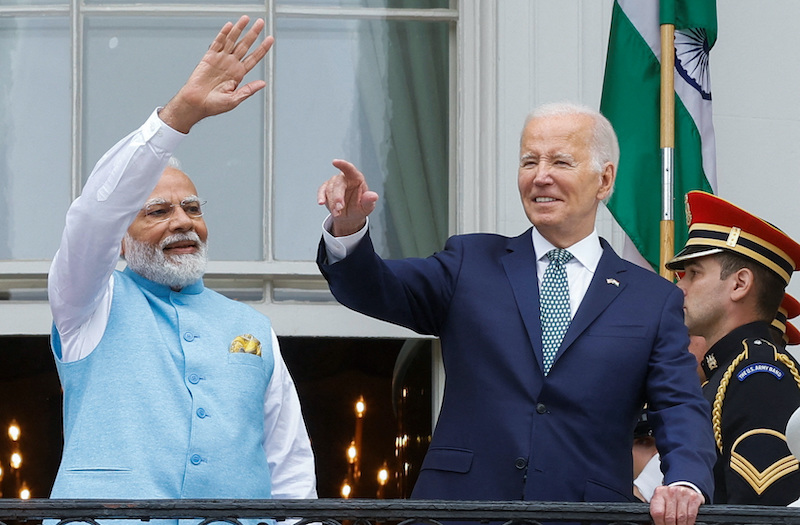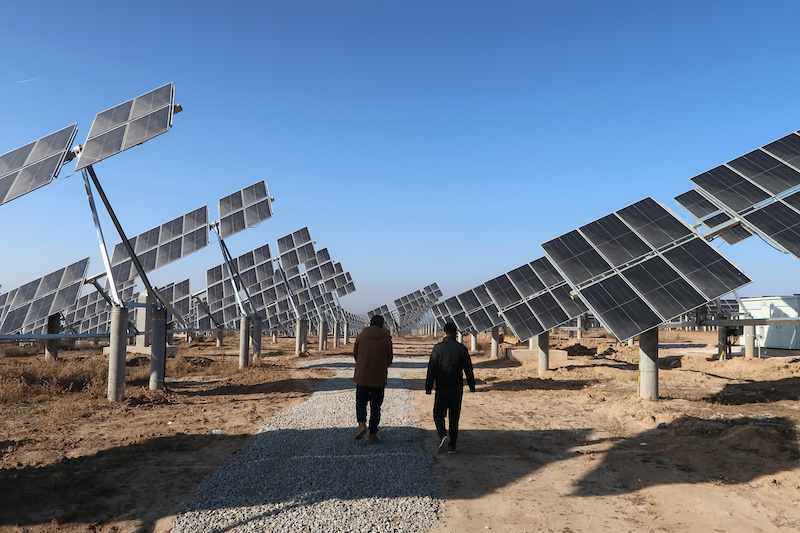India and the United States announced deals on defence and key commercial sectors on Thursday as US President Joe Biden and Narendra Modi hailed a new era in bilateral ties.
While the White House rolled out the red carpet for the Indian prime minister, the two countries confirmed agreements on computer chips, critical minerals, technology, space cooperation, as well as defence sales and cooperative arrangements aimed at countering China’s global influence.
Some of the deals aim to diversify supply chains to reduce dependence on China. Others are aimed at cornering the market in advanced technologies that may feature on the battlefields of the future.
They also ended disputes at the World Trade Organization, with India removing some tariffs on US goods.
ALSO SEE:
Biden Plays Down Impact of Calling China’s Xi a ‘Dictator’
Commercial and defence tie-ups ramped up
The United States is India’s largest trading partner but the US has much larger trade dealings with China, the European Union and North American neighbours.
Biden and Modi signed off on a deal to allow General Electric to produce jet engines in India to power Indian military aircraft, through an agreement with Hindustan Aeronautics.
US Navy ships in the region will be able to stop in Indian shipyards for repairs under a maritime agreement, and India will procure US-made armed MQ-9B SeaGuardian drones.
US chipmaker Micron Technology‘s plans a $2.7 billion semiconductor testing and packaging unit, to be built in Modi’s home state of Gujarat.
The US will also make it easier for skilled Indian workers to get and renew US visas.
India also agreed to join the US-led Artemis Accords on space exploration and to work with NASA on a joint mission to the International Space Station in 2024.
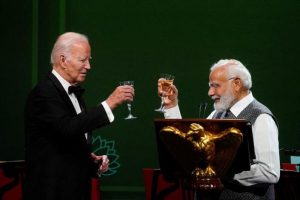
‘Clouds of coercion shadow the Indo-Pacific’
“Two great nations, two great friends, and two great powers. Cheers,” Biden told Modi in a toast at a state dinner. Modi said in reply: “You are soft spoken, but when it comes to action, you are very strong.”
Though the countries are not formal treaty-bound allies and India has long relished its independence, Washington wants Delhi to be a strategic counterweight to China. While neither leader criticized Beijing directly in official statements, they alluded to the Xi Jinping-led government.
“The dark clouds of coercion and confrontation are casting their shadow in the Indo Pacific,” Modi told Congress. “The stability of the region has become one of the central concerns of our partnership.”
After Biden and Modi spoke privately for more than two hours, a joint statement included a warning of rising tensions and destabilizing actions in the East and South China Sea and stressed the importance of international law and freedom of navigation.
“The challenges and opportunities facing the world in this century require that India and the United States work and lead together, and we are,” Biden said as he welcomed Modi to the White House.
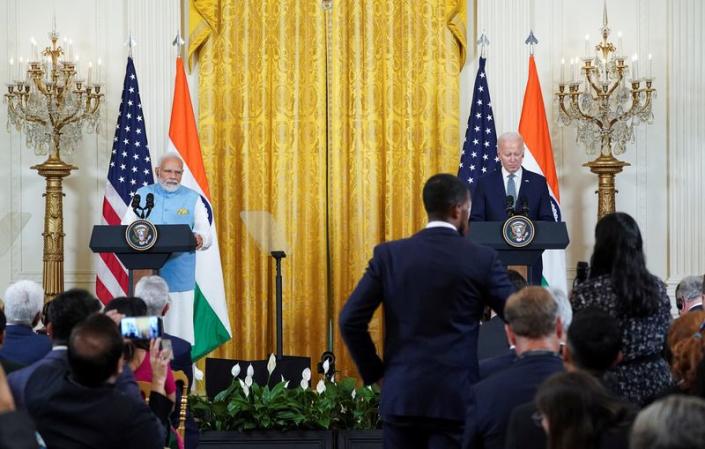
Tech CEOs at White House dinner
The state dinner, held in a large tent on the White House lawn, featured a number of Silicon Valley executives on the guest list, including Apple’s Tim Cook, 23andMe CEO Anne Wojcicki, Google CEO Sundar Pichai, OpenAI CEO Sam Altman, among others.
With the slightly Indian-accented dinner, the Bidens followed a White House tradition of serving guests from abroad food that has faint echoes of home with a strong American bent.
Modi is seeking to raise the status that India, the world’s most populous country at 1.4 billion and fifth-largest economy, has on the world stage as a manufacturing and diplomatic powerhouse while navigating strained ties with China.
His participation in a White House press conference itself was a reflection of contrasting political traditions, marking the first time Modi has taken questions in such a format in his nine-year tenure. He took one question apiece from an American and an Indian journalist selected in advance, and dismissed criticism about India’s human rights record.
Washington has been frustrated by India’s close ties with Russia while Moscow wages war in Ukraine. Modi avoided direct mention of Russia, but told lawmakers the conflict was “causing great pain in the region. Since it involves major powers, the outcomes are severe.”
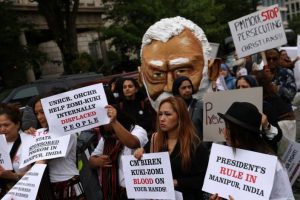
Boycotts and welcome crowds
Modi’s visit was not without controversy. The speech to Congress, normally a bipartisan affirmation of a visiting leader from an allied nation, was boycotted by some liberal lawmakers, who cited the Modi government’s treatment of India’s Muslim minority.
“I encourage my colleagues who stand for pluralism, tolerance and freedom of the press to join me in doing the same,” Representative Alexandria Ocasio-Cortez tweeted on Wednesday.
Modi’s speech to the Congress also drew a crowd of on-lookers who chanted “Modi, Modi” at applause lines.
As some 7,000 well-wishers gathered for a colorful opening ceremony at the White House, a far smaller group of demonstrators gathered blocks away to protest the Biden administration’s coziness with Modi, who leads the Hindu nationalist Bharatiya Janata Party.
Asked by a US reporter about what steps he would take to improve the rights of Muslims and other minorities, Modi said “there’s absolutely no space for discrimination” in India.
Biden told reporters he and Modi had a straightforward discussion about democratic values.
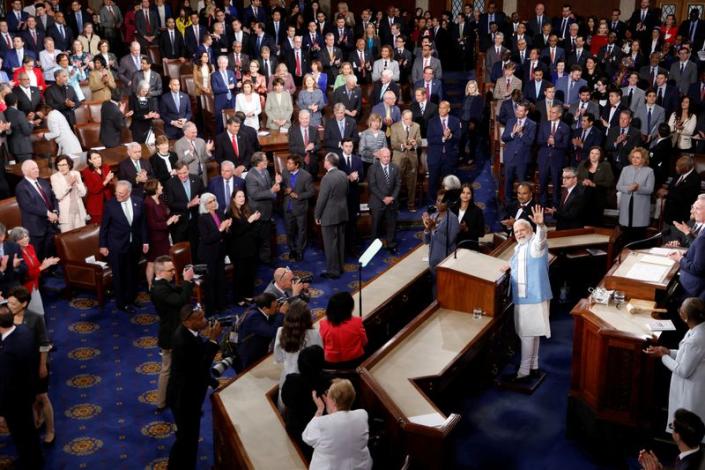
‘Path-breaking landmark visit’
Indian Foreign Secretary Vinay Kwatra said the visit so far had been “truly pathbreaking” and New Delhi is confident it will help take the relationship with Washington to “higher reaches”.
“The richness of form and substance of the visit clearly tells you that it’s an exceptional, landmark, pathbreaking visit,” Kwatra told reporters.
“The decisions taken during the visit are truly transformative across a wide range of areas. Naturally, it is something which is possible when the countries have deep trust in each other and are in it for long term.”
- Reuters with additional editing by Jim Pollard
ALSO SEE:
Micron to Pump $825m Into First India Chipmaking Plant
India’s Modi Eyes Tech Sharing, Defence Deals on Key US Visit
Indian Red Tape Delays Over $2-Billion Drone Purchase From US
China, India Imports of Russian Oil Surge to Record Highs




